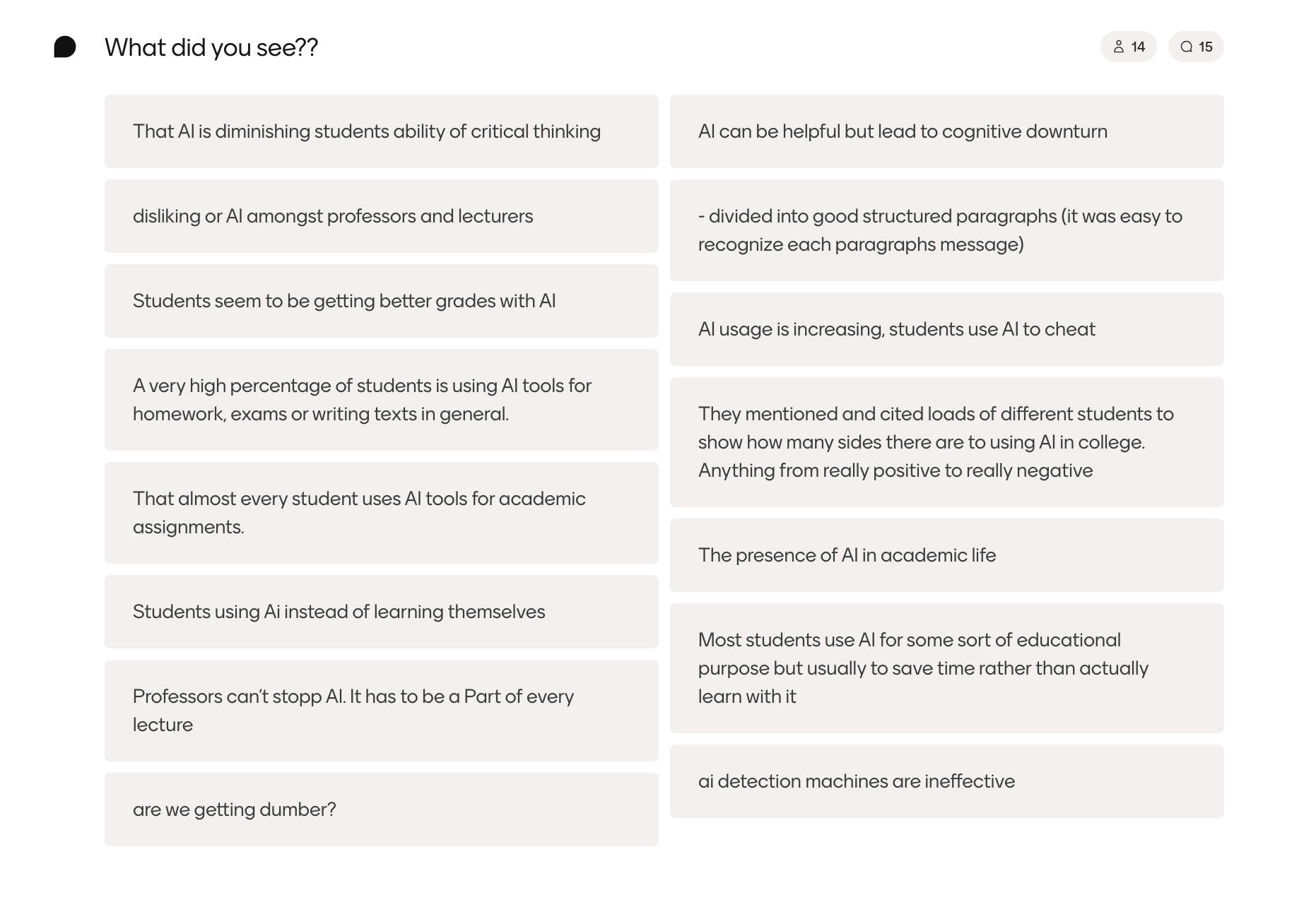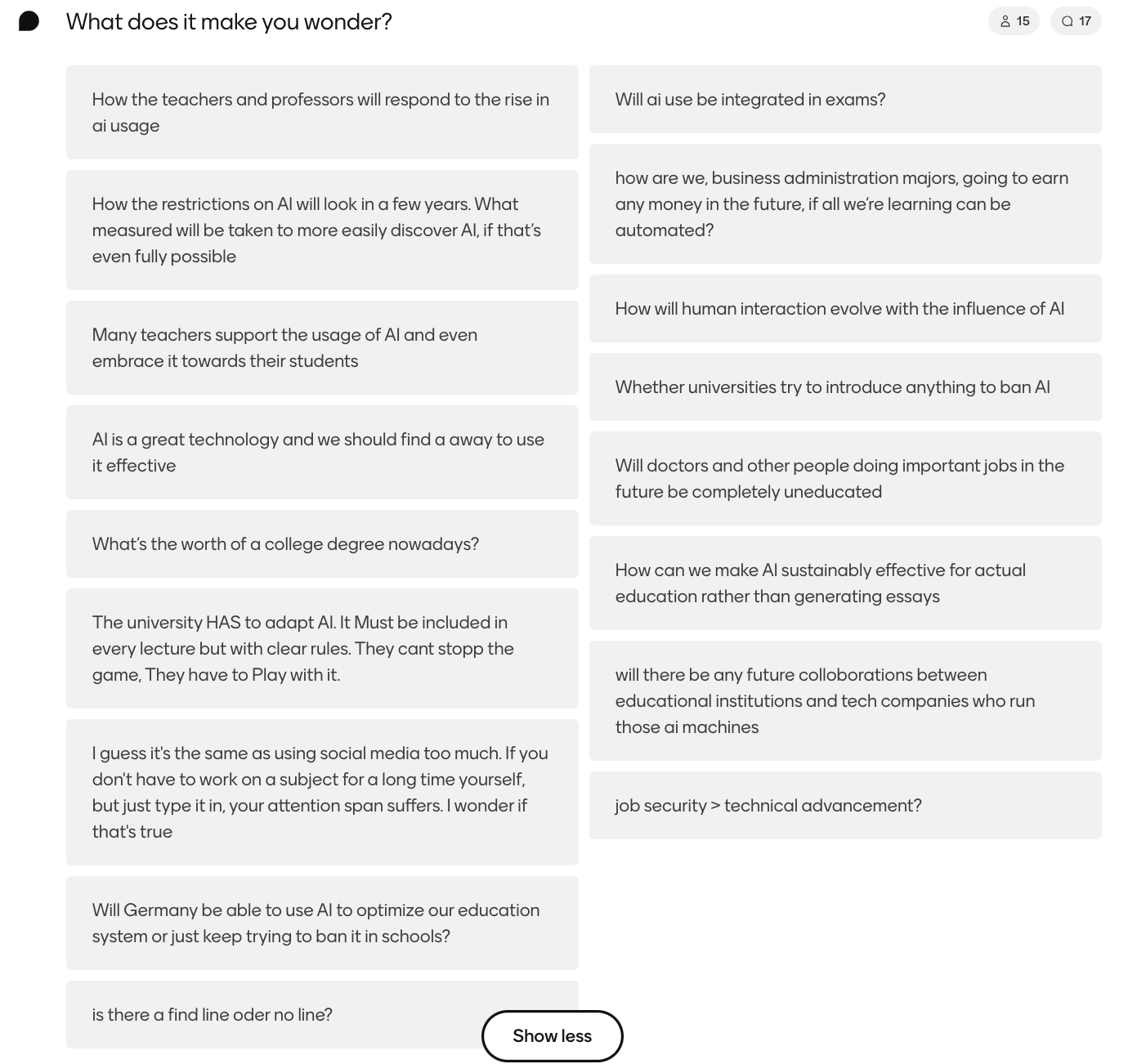“Are We Getting Dumber?” What my students really think about AI, cheating, and the future of higher ed
When I assigned the New York Magazine article "Everyone Is Cheating Their Way Through College" to my C1 Business English students, I expected a typical class discussion with some. What I got instead was a window into the complex reality of AI in higher education and some uncomfortable truths about how artificial intelligence is reshaping the college experience. A nuanced, sometimes uneasy, portrait of how AI is reshaping learning, motivation, and students’ sense of the future.
Using the "See, Think, Wonder" thinking routine (one of my absolute favorites) through Mentimeter, my students shared their honest observations, reflections, and concerns about AI's role in their academic lives. Their responses revealed far more than I anticipated about the current state of AI in education and its implications for the future of learning.
What students See: AI is everywhere
Right away, my students described a campus where AI is everywhere. Nearly all observed that a very high percentage of their peers use AI tools for homework, exams, and writing assignments. The shift is so complete that one student commented, “Professors can’t stop AI. It has to be a part of every lecture.”
Their observations painted a clear picture of widespread adoption:
Students noted that an extremely high percentage of their peers use AI tools for homework, exams, and writing assignments. (Notice that nobody mentioned how often they use it)
Better grades, but at what cost? Students noted that AI seems to help with grades, but they questioned whether this comes at the expense of genuine learning.
There is a clear divide between professors who remain skeptical and students who embrace AI for convenience
Students know AI detection tools aren’t working. The focus should shift from policing to integrating AI meaningfully.
One student's blunt question captured the mood perfectly: "Are we getting dumber?" Perhaps most concerning, students agreed that AI is diminishing their critical thinking abilities.
As a teacher, I’m shocked by how quickly AI has moved from being a support tool to becoming the default way students approach assignments. The consensus among my students was clear, teachers can't stop AI use, so it needs to become part of every lecture with clear guidelines rather than blanket restrictions.
What students think: The convenience vs. learning dilemma
Moving beyond observations, students shared what the article made them think about regarding their own educational experience. Their reflections revealed a generation grappling with fundamental questions about learning and effort:
“Most students are too lazy to solve more complex work on their own.”
“Students lose confidence in their own skills and get lazier.”
“Students would rather get a good grade than actually learn something about the topic.”
“It makes me worry about the future of our society.”
“What is the point of studying at this point?”
Many students acknowledged that their peers are becoming "too lazy to solve complex problems," using AI to make school easier and save time. This self-awareness was both refreshing and concerning. While some see AI as a tool for efficiency and better grades, they questioned whether this comes at the expense of genuine learning and skill development. Students then expressed worry about the long-term impact on the future workforce and society, This is when we began a debate around whether AI is making us less intelligent or simply freeing up time for creativity.
Several students called for clearer guidelines and more honest conversations about AI, recognizing that cheating has become too easy, and the rules haven’t kept up. As one put it,
“Guidelines in schools need to be improved, cheating has become too easy, students don’t see a reason to do tasks on their own anymore.”
We ended what students “think” with them recognizing they're losing confidence in their own skills, with critical thinking and independent problem-solving abilities suffering as a result. Perhaps most tellingly, one student wondered aloud: "What is the point of studying at this point?" when AI can handle so many academic tasks.
What Students Wonder: questions about education's future, jobs and skills
The final phase of our activity revealed the existential concerns, anxiety and curiosity weighing on students' minds. Their questions fell into three main categories that educators in higher education need to address:
University response and adaptation
Students are incredibly aware that educational institutions must evolve. They wonder:
“How will teachers and professors respond to the rise in AI usage?”
“Will AI use be integrated in exams?”
“Will Germany be able to use AI to optimize our education system or just keep trying to ban it in schools?”
“Will there be any future collaborations between educational institutions and tech companies who run those AI machines?”
One student captured this sentiment perfectly:
““The university HAS to adapt AI. It must be included in every lecture but with clear rules. They can’t stop the game. They have to play with it.””
The Value of Higher Education
Perhaps the most troubling theme was students questioning the fundamental worth of their education:
"What's the worth of a college degree nowadays?"
"How are we, business administration majors, going to earn any money in the future, if all we're learning can be automated?"
"Will doctors and other people doing important jobs in the future be completely uneducated?"
“Job security > technical advancement?”
These questions reveal deep anxiety about career prospects and the relevance of traditional education models.
Ethics and Society
“How will human interaction evolve with the influence of AI?”
“Is there a fine line or no line?”
“How can we make AI sustainably effective for actual education rather than generating essays?”
“I guess it’s the same as using social media too much. If you don’t have to work on a subject for a long time yourself, but just type it in, your attention span suffers. I wonder if that’s true.”
What This Means
Reading these questions, I realized how important it is to make space for students to reflect and discuss what these changes mean for them, not just for our teaching practice. I’ve been so focused on making my classes and assignments relevant with AI that I completely overlooked the emotional and existential concerns students have. They're not just worried about grades, they're genuinely anxious about their future roles in society and whether their degrees will hold value. This thinking routine reminded me that beyond the convenience of AI, students are carrying real anxieties and big questions about what comes next. As educators, we owe it to them to create room for honest dialogue about what these changes mean for them personally and professionally, and to help them navigate these uncertainties together.
Teaching in an AI-Rich Environment
It is no surprise that the tension between efficiency and deep learning is real and visible to both educators (even if some are still turning a blind eye) and students. If we want to cultivate independent thinkers, we must create space for students to struggle, reflect, and grow even in an AI-rich environment.
The challenge now is helping students use AI as a tool for learning enhancement, rather than a shortcut around learning itself. This requires:
Open conversations about AI use and its implications
Teaching strategies that emphasize critical thinking and problem-solving
Support systems that address students' concerns about their future careers
Curriculum adaptation that prepares students for an AI-integrated workplace
Easier said than done, right??
Particularly when we are already juggling so much.
I leave you with some questions
Might you consider this:
What are your students seeing, thinking, and wondering about AI in your classroom?
How is AI showing up in your classroom?
Are your students prioritizing efficiency and grades over genuine learning?
What are your students wondering about as AI transforms education?
How are you helping them navigate these big questions?
How are you helping them engage with these changes in a way that supports both learning and well-being?
What conversations do we need to have NOW to ensure higher education remains meaningful in the age of AI?
The conversation about AI in higher education is far from over. By listening to our students' honest reflections and addressing their concerns head-on, we can work together to create an educational environment that prepares them for the future while preserving the critical thinking skills that make them uniquely human.
What questions are your students asking about AI and education? Share your experiences in the comments below. I REALLY WANT TO READ THEM!
Looking for more insights on teaching and learning with AI? Subscribe to Marianas Learning Space for regular updates on educational technology and innovative teaching strategies.



